07 January 2022
This week’s spellings are from the common exception words list.
Year 1: school, she, so, some, the
Year 2: after, again, any, bath, because, beautiful, behind, both, break, busy
Week beginning 10 January 2022
Hi everyone
We hope you’re feeling happy and healthy at home. We miss having you in school but we want you to know that you’re still very much part of our school community. Enjoy your home learning for this week.
Maths
Follow this sequence of maths learning which is linked to multiplication and division.
- Lesson 1: video, worksheet, answers
- Lesson 2: video, worksheet, answers
- Lesson 3: video,
- Lesson 4: video, worksheet, answers
- Lesson 5: video,
- Lesson 6: video, worksheet, answers
- Lesson 7: video, worksheet, answers
- Lesson 8: video,
- Lesson 9: video,
- Lesson 10: video, worksheet, answers
You don’t have to print the worksheet. Your child can write or draw their answers on paper. Your child’s learning will be most effective if you sit with them to pause the clip and check / praise / support your child as the clip moves on.
Practise times tables on Times Table Rockstars, too. If your child is in Y3, we’re concentrating on the 8 times table. If your child is in Y4, we’re concentrating on all times tables up to and including 12 x 12. Email the class teacher if you need your child’s login and password details.
(Suggested time: 30 minutes of Maths and 15 minutes of Rockstars daily)
Spelling
Look on the homework page to find this week’s spellings. They should choose some past spellings that they feel less confident with. Your child should complete one task each day.
- Day 1: Generate more words linked to the spelling pattern or ‘rule’. You could look out for the words in the book you’re reading at home, or any other text, like a website linked to our science topic of Living Things and their Habitat.
- Day 2: Practise the spellings using two of the ideas in our Super Spelling Strategies guide. (Set yourself and others at home a challenge of using some of the words when you’re speaking, too!)
- Day 3: Write separate sentences, each containing one of the spellings. (Don’t forget to show off really neat handwriting and make sure you sentence starts with a capital letter and ends with a full stop, exclamation mark (!) or question mark (?).
- Day 4: Repeat Task 2 or 3.
- Day 5: Get an adult at home to test you on your spellings. Practise any you spell incorrectly – you could write them out carefully until you’re sure.
(Suggested time: 15-20 minutes daily)
Reading fluency
This is the text we’re using in class this week to build up fluency skills.
In school, we generally follow this sequence:
- Day 1: Read the text aloud with your child listening. Read it clearly and slowly, pointing to each word as you read. Have a chat about any unfamiliar words.
- Day 2: Read aloud each sentence (a full short sentence or part of a longer sentence), and have your child read it back to you. Do this ‘echo reading’ for the whole text.
- Day 3: Read the text and talk about the effect of the punctuation on how you read it – pauses for full stops and expression for exclamations (!) or questions (?). Your child reads the text aloud.
- Day 4: Read together with expression (just like you practised on Day 3).
- Day 5: Your child reads independently and fluently.
(Suggested time: 15 minutes daily)
Reading comprehension
We’ll be using this RIC text in class to practise comprehension skills. RIC stands for:
- Retrieve: finding information in a text
- Interpret: using clues in the text to unlock information
- Choice: thinking about the author’s choice of words, techniques or organisation that make the text interesting and enjoyable to read
Follow these lessons from Oak National Academy. There’s a whole series of lessons, but start at Lesson 1 and work through, doing one (or maybe even two) each day. (If you’re self-isolating in your second week, stick with the series of lessons you’ve already started and aim to complete the full series.)
(Suggested time: 30 minutes daily)
Writing
Follow these lessons from Oak National Academy. There’s a whole series of lessons, but start at Lesson 1 and work through, doing one (or maybe even two) each day. (If you’re self-isolating in your second week, stick with the series of lessons you’ve already started and aim to complete the full series.)
(Suggested time: 30-40 minutes for each)
Topic
Our topic this half-term is about history.
Follow these lessons from Oak National Academy. There’s a whole series of lessons, but start at Lesson 1 and work through, doing one (or maybe even two) each day. (If you’re self-isolating in your second week, stick with the series of lessons you’ve already started and aim to complete the full series.)
(Suggested time: 30-40 minutes)
Science
Our focus this half-term is about light.
These six lessons from Oak National Academy link closely to what we’ve been doing in class. Start at Lesson 1 and work through, doing two or three in the week. If you’ve previously completed on of these lessons, have a go at the ones you haven’t completed yet.
If Science really motivates your child, you could also use look at these lessons all about practical Science.
(Suggested time: 30-45 minutes)
PE
Don’t forget to do some daily exercise!
Do two or three of these Five Minute Moves from Joe Wicks each day – spread them across the day as if they were playtimes, maybe!
Try working through this series of 25 lessons from the Association for Physical Education – do two or three in the week.
(Suggested time: 5 minutes daily, plus 30 minutes for the longer PE lessons)
Extra stuff…
As an extra (or as an alternative, if this helps to motivate your child)…
Fancy learning about a new religion? You don’t have to be religious to learn about, and appreciate, religions from all around the world. Check out this set of lessons from Oak National Academy – you could choose to focus on one religion or dip into each set for an overview.
What about some Living and Learning? While you’re away from school, you could check out these lessons on keeping safe!
Happy New Year!
Happy New Year! We hope that you all had a fantastic Christmas. It was lovely to see lots of happy smiling faces when I opened the classroom door on Tuesday morning. We particularly enjoyed listening to all of their wonderful Christmas memories.
Now that Christmas is over, we head into a very cold and frost half-term. However, we love the frosty weather in Reception because it’s a fantastic stimulus for our ‘mini’ topic: Frozen Planet. Throughout the next three weeks, we will investigate ice, use our senses to describe how the weather has changed. We will also look at the coldest regions on Earth and learn about different Polar animals.
This week the children enjoyed being back with their friends and have been settling back into their daily routines.
Here are some highlights from a fantastic first week back.
Making igloos with sugar cubes.
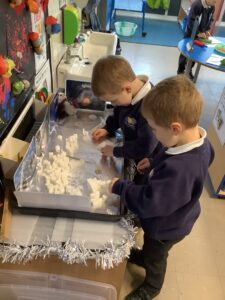
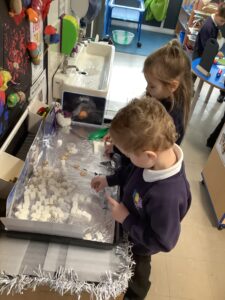
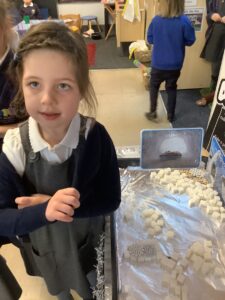
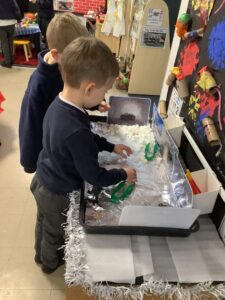
Reading the new winter books in the igloo.
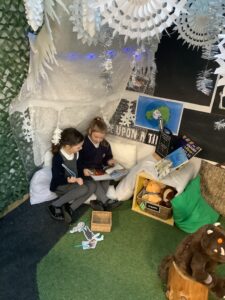
Making different arrangements with five 2d shapes.
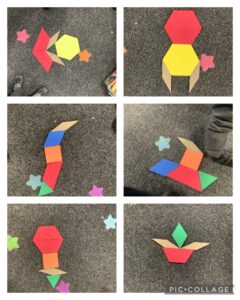
The small world and construction area was a very busy area this week. We saw lots of great teamwork, designs, and building skills.
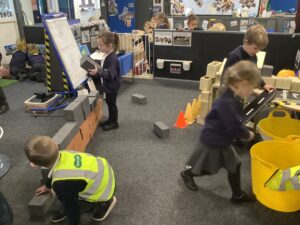
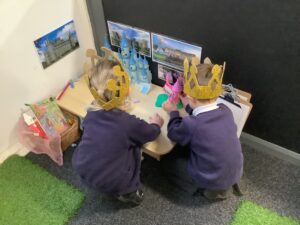
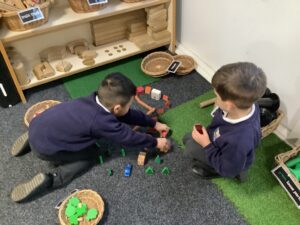
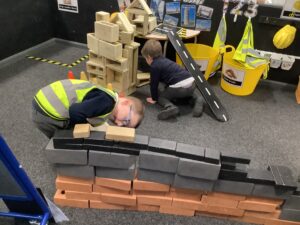
Reading
Yesterday, your child brought home a letter explaining our new phonics scheme (Little Wandle) and the new Collins e-books. Please make sure you read this letter. If you have any questions about this, please do ask!
Moving forwards, your child will read in school at least three times a week. After your child has read in school, your child will be assigned the same book as an e-book every Friday for them to show off their reading skills. They will also bring home an extra physical book to read at home.
Library books will continue to be changed every Thursday.
What will my child bring home to support their reading?
- E-book – assigned every Friday
- Extra physical book – changed every Friday
- Libary book – changed every Thursday
Reminders
- The weather is very mixed at the moment. Remember to wear a warm, waterproof coat to school and bring a named hat and pair of gloves.
- PE is every Wednesday. Please make sure your child comes to school wearing the correct clothes. If you are unsure and need a reminder, please see our uniform policy.
- Due to the current situation, the stay and learn sessions (20/01 & 07/02) are cancelled.
Home-Link Challenge
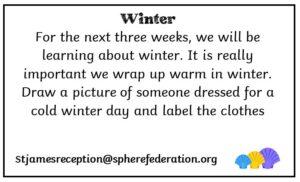
This week’s message (Friday 07 January 2022)
Happy new year! We hope 2022 has started well for you. Our first message of the year has three parts: an attendance update; some information about books we’re sending home for children in Reception and Key Stage 1; and some information about forthcoming workshops.
Attendance matters
It’s difficult deciding whether your child should attend school if they’re poorly. It’s even more difficult in these Covid times. Children have missed out on so many days of learning in school because of lockdowns and isolating, and yet we know you’re careful that your child isn’t attending school if they’re displaying any Covid symptoms.
- Thank you for taking care to look after your own child – and everyone around them, too.
- Equally, thank you for making sure that your child gets to school as much as possible, and on time, when it’s been safe to do so.
Our whole-school attendance figure for the Autumn term was 94.1%. Well over one out of every ten pupils have 100% attendance so far this year – that’s great! Here’s an update on the attendance for each year group:
- Reception: 93.7%
- Year 1: 94.9%
- Year 2: 96.1%
- Year 3: 91.9%
- Year 4: 91.7%
- Year 5: 96.3% – the highest in school, so well done!
- Year 6: 95.8%
Reading at home
This section is for parents and carers of children in Early Years and Year 1. Something similar may be happening for Year 2 children – check with your child’s class teacher.
Earlier this week, we sent some information home about a change to what books we’ll send home. Since then, a few parents have asked for a bit more information about why we’re now asking you to read e-books at home.
It might help to be clear that there are two types of book.
The practice books are short books with simple words that your child will be able to ‘decode’ (to read). In school, these are physical books; at home, it’s the same text as an e-book. Your child will have read this book at least three times in school across the week. They’re for children to practise the phonics that they’ve learnt in school – matching letters to sounds. They’re also for you to celebrate your child’s increasing phonics skills. Reading the book won’t take more than about 10-15 minutes.
The sharing books are physical books (not e-books), typically chosen by your child. They’re likely to be longer. These books are to read together and enjoy. Your child is unlikely to be able to read all of the text independently. You’ll probably spend more time over a few days reading together the sharing books than the practice books.
Here are some of the reasons we’ve chosen to use a web-based approach for the practice books at home:
- the e-books mean the hard copies of the same books stay in school and therefore there will be less chance of some going missing – this is essential as even just one missing book will undermine the impact when we practise reading in school
- we’ve been really impressed by the appearance and user-interface of the website
- we’ve consulted other school leaders – the feedback about e-books has been overwhelmingly positive
Workshops
Coming up next week is a Zoom session for parents and carers of children in Year 6, although others are welcome to attend, too. It’s to provide you with information about the end of Key Stage 2 assessments (the ‘SATs’) that will take place in the week beginning Monday 09 May.
The session is on Thursday 13 January and starts at 6pm. It’ll last around 30 minutes, and there’ll be opportunities to ask any questions that you might have.
We’ll send to Year 6 parents and carers the Zoom link. For other parents and carers, if you’re interested in attending, please either send us a message on the School Gateway app or email the school office. We’ll then email the Zoom joining details out to all those who have expressed an interest.
Talking of workshops, there are also some coming up about special education needs and disabilities (SEND). These come from Leeds Special Educational Needs and Disabilities Information and Advice Support Service (not us) – read more about the workshops here.
Next week’s message comes from Mr Wilks, who leads on Science and topics across Sphere Federation. He’ll provide an overview of the History learning that’s happening in Key Stage 1 and 2, and how you might help at home. In the meantime, have a great weekend.
Science Update
It’s time for us to be biologists this half term in Science and with this we will be studying evolution and inheritance.
The world renowned scientist, Charles Darwin first theorised about evolution back in the 1800s. He noticed that different species had different traits or characteristics which allowed them to adapt to the environment that they were living in. He came up with the idea of natural selection, whereby animals adapt in order to survive.
Biologists also use fossils to find out about prehistoric times before history was actively recorded. We will be following in the footsteps of famous palaeontologist. Mary Annoying by studying fossils and what they can tell us about the past in our first week.
Keep checking back for more news on this exciting topic.
07 January 2022
This week’s spelling are all homophones but are quite advanced and use different strings of letters. Learn them using the strategies we have practised in class for a test on Thursday 13 January.
desert
dessert
stationary
stationery
complement
compliment
principle
principal
prophet
profit
07 January 2022
Our first Talk Time of 2022 has a reading and oracy theme.
I know a poem.
This week, you’re going to be learning a famous poem. It takes great resilience and remembering skills to be able to learn a poem – two of our 8Rs for learning.
Y1,2: Growing by Tony Milton
Given the length of this poem, this chunk of the first verse is what we’d like you to learn.
Today
you may be small.
But one day
you’ll be tall,
like me,
maybe taller.
You won’t
fit into your bed.
Your hat
won’t fit on your head.
Your feet will fill up the floor.
You’ll have to bend down
to come through the door.
Y3,4: The Romans in Britain by Judith Nicholls
The Romans gave us aqueducts,
Fine buildings and straight roads,
Where all those Roman legionaries
Marched with heavy loads.
They gave us central heating,
Good laws, a peaceful home…
Then after just four centuries
They shuffled back to Rome.
Y5,6: From a Railway Carriage by Robert Louis Stevenson
Faster than fairies, faster than witches,
Bridges and houses, hedges and ditches;
And charging along like troops in a battle,
All through the meadows the horses and cattle:
All of the sights of the hill and the plain
Fly as thick as driving rain;
And ever again, in the wink of an eye,
Painted stations whistle by.
Here is a child who clambers and scrambles,
All by himself and gathering brambles;
Here is a tramp who stands and gazes;
And there is the green for stringing the daisies!
Here is a cart run away in the road
Lumping along with man and load;
And here is a mill and there is a river:
Each a glimpse and gone for ever!
These talking points could be used to support your initial reading and understanding of the poem:
- What’s the poem about?
- Can you work out the meaning of tricky words and phrases by using the clues in the poem?
- What’s the rhythm of the poem? Where do you pause for breaths?
- Are there any rhymes (words ending with the same sounds (eg cat and hat)?
- What other patterns do you notice (repeated words/lines, line lengths, themes/key messages)?
When you have a sound understanding of your chosen poem, turn your attentions to reading it aloud with confidence and clarity. This week’s Remember 2s (R2s) will help with that:
- Speak clearly in a loud voice without shouting.
- Pause for breath at the right places to make sure you read at an appropriate pace.
- Face the reader as often as you can.
Here are some creative strategies that you might use to help you remember the poem – do what works best for you:
- Create actions to go with certain words or phrases.
- Draw a series of pictures to help you remember what comes next.
- Say or sing the poem in a unique or funny voice.
- Echo phrases/lines with someone at home.
Maths – Angles are everywhere
This week, the children have been learning about angles.
What is an angle?
Angles are a measure of turn or the space between two lines that meet each other.
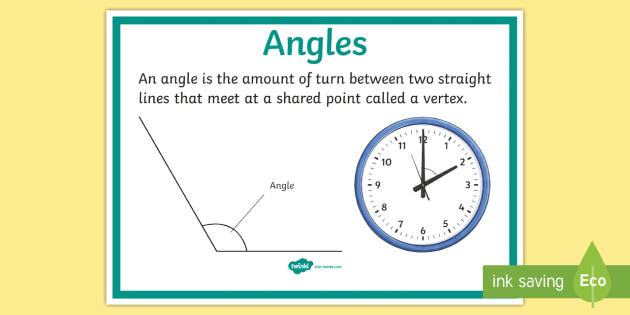
Using two strips of paper, joined by a split pin, the children created their own angle detectors. The instructions below were carefully explored by the class.
- Starting with the strips on top of one another:
- Turn one strip a very small amount
- Turn it about half way round
- Turn it all of the way around
- Look at the clock on the wall and try to arrange your strips to match the hands on it
- Make some big angles.
- Make some small angles.
Then, we went outside to investigate different sized angles around school.
At home, make angle detectors with your child and find different sized angles around the home. Can your child tell you about a right angle?
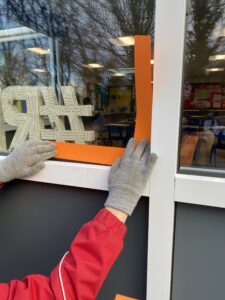
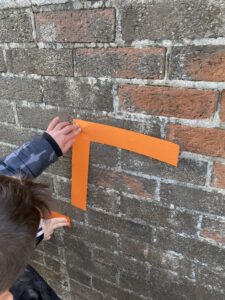
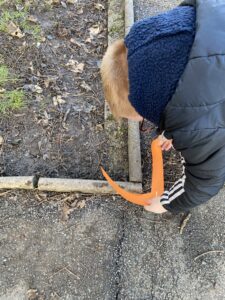
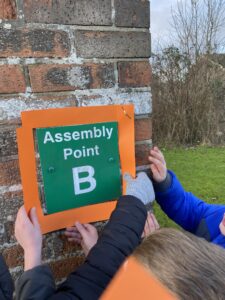
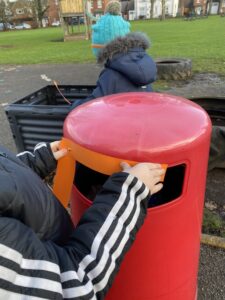
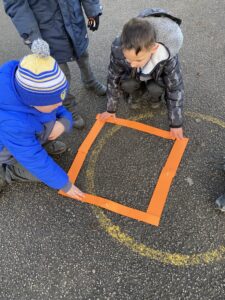
This half-term’s Christian value is…
…love.
In Mark Chapter 12, Jesus was asked which of the ten commandments was the most important, to which he replied, “‘Love the Lord your God with all your heart and with all your soul and with all your mind and with all your strength’. The second is this: ‘Love your neighbour as yourself.’ There are no commandments greater than these.”
The challenge for us is how can we show love to each other on a daily basis. How can we encourage each other? How can we make someone smile? How can we show love for our school and our world?
Why was this Christian value chosen?
‘Love is why Jesus came into the world – to send out love.’
Home challenge:
Which is your favourite film or book? Think about the main characters in it – how do they show love? For example, Aslan in The Lion, the Witch and the Wardrobe – how does he show love?
Do everything in love.
(1 Corinthians 16:14)
We love because He first loved us.
((1 John 4:19)
This week’s bible story
‘Love is patient, love is kind. It does not envy, it does not boast, it is not proud. It does not dishonour others, it is not self-seeking, it is not easily angered, it keeps no record of wrongs. Love does not delight in evil, but rejoices with the truth. It always protects, always trusts, always hopes, always perseveres. Love never fails.’ (1 Corinthians 13.4-8)
In February, we celebrate Valentines Day. This was originally the day for the Church to celebrate or remember St Valentine, but over time, it has developed into a day to send cards, buy presents or flowers and celebrate love. What do you think love means?
Watch this video of Anna and Hans from Frozen. Anna and Hans have apparently fallen head over heels in love: love at first sight! Ask the children what love looks like to Anna and Hans. There is so much more to love than this. Love is something that we all experience, and in different ways: the love of parents or carers, of grandparents, siblings, friends . . . these are all different types of love, but they all give us a glimpse of what love is.
Reflection:
There is a passage in the Bible that tells us more about what love is like. It is a passage that is often read at weddings.
‘Love is patient, love is kind. It does not envy, it does not boast, it is not proud. It does not dishonour others, it is not self-seeking, it is not easily angered, it keeps no record of wrongs. Love does not delight in evil, but rejoices with the truth. It always protects, always trusts, always hopes, always perseveres. Love never fails.’ (1 Corinthians 13.4-8)
This definition sets the bar pretty high! In truth, as human beings, we do boast and we aren’t always patient and kind. However, when we feel love, we get to experience the qualities in this definition, such as patience and kindness.
Christians believe that love is God’s gift to earth, so when Jesus came to earth and died on the cross, he did it to demonstrate this love.
How we can show this love to others. How can we be the people to demonstrate love in the world around us?
Prayer:
Dear God,
Thank you for your gift of love.
Please help us to show this love to other people.
Amen.